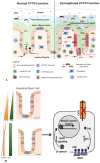CFTR and Gastrointestinal Cancers: An Update
- PMID: 35743652
- PMCID: PMC9224611
- DOI: 10.3390/jpm12060868
CFTR and Gastrointestinal Cancers: An Update
Abstract
Cystic Fibrosis (CF) is a disease caused by mutations in the CFTR gene that severely affects the lungs as well as extra-pulmonary tissues, including the gastrointestinal (GI) tract. CFTR dysfunction resulting from either mutations or the downregulation of its expression has been shown to promote carcinogenesis. An example is the enhanced risk for several types of cancer in patients with CF, especially cancers of the GI tract. CFTR also acts as a tumor suppressor in diverse sporadic epithelial cancers in many tissues, primarily due to the silencing of CFTR expression via multiple mechanisms, but especially due to epigenetic regulation. This review provides an update on the latest research linking CFTR-deficiency to GI cancers, in both CF patients and in sporadic GI cancers, with a particular focus on cancer of the intestinal tract. It will discuss changes in the tissue landscape linked to CFTR-deficiency that may promote cancer development such as breakdowns in physical barriers, microbial dysbiosis and inflammation. It will also discuss molecular pathways and mechanisms that act upstream to modulate CFTR expression, such as by epigenetic silencing, as well as molecular pathways that act downstream of CFTR-deficiency, such as the dysregulation of the Wnt/β-catenin and NF-κB signaling pathways. Finally, it will discuss the emerging CFTR modulator drugs that have shown promising results in improving CFTR function in CF patients. The potential impact of these modulator drugs on the treatment and prevention of GI cancers can provide a new example of personalized cancer medicine.
Keywords: CFTR; cystic fibrosis; gastrointestinal cancers; modulators; tumor suppressor gene.
Conflict of interest statement
The authors declare no conflict of interest.
Figures


Similar articles
-
Cystic Fibrosis, CFTR, and Colorectal Cancer.Int J Mol Sci. 2020 Apr 21;21(8):2891. doi: 10.3390/ijms21082891. Int J Mol Sci. 2020. PMID: 32326161 Free PMC article. Review.
-
The Intestinal Microbiome and Cystic Fibrosis Transmembrane Conductance Regulator Modulators: Emerging Themes in the Management of Gastrointestinal Manifestations of Cystic Fibrosis.Curr Gastroenterol Rep. 2021 Aug 27;23(10):17. doi: 10.1007/s11894-021-00817-2. Curr Gastroenterol Rep. 2021. PMID: 34448955 Review.
-
Role of ion channels in gastrointestinal cancer.World J Gastroenterol. 2019 Oct 14;25(38):5732-5772. doi: 10.3748/wjg.v25.i38.5732. World J Gastroenterol. 2019. PMID: 31636470 Free PMC article. Review.
-
Cftr Modulates Wnt/β-Catenin Signaling and Stem Cell Proliferation in Murine Intestine.Cell Mol Gastroenterol Hepatol. 2017 Dec 7;5(3):253-271. doi: 10.1016/j.jcmgh.2017.11.013. eCollection 2018 Mar. Cell Mol Gastroenterol Hepatol. 2017. PMID: 29675451 Free PMC article.
-
Inflammatory Activity of Epithelial Stem Cell Variants from Cystic Fibrosis Lungs Is Not Resolved by CFTR Modulators.Am J Respir Crit Care Med. 2023 Nov 1;208(9):930-943. doi: 10.1164/rccm.202305-0818OC. Am J Respir Crit Care Med. 2023. PMID: 37695863 Free PMC article.
Cited by
-
Role of the Mitochondrial E3 Ubiquitin Ligases as Possible Therapeutic Targets in Cancer Therapy.Int J Mol Sci. 2023 Dec 6;24(24):17176. doi: 10.3390/ijms242417176. Int J Mol Sci. 2023. PMID: 38139010 Free PMC article. Review.
-
Cystic Fibrosis and Cancer: Unraveling the Complex Role of CFTR Gene in Cancer Susceptibility.Cancers (Basel). 2023 Aug 24;15(17):4244. doi: 10.3390/cancers15174244. Cancers (Basel). 2023. PMID: 37686519 Free PMC article. Review.
-
Advancements in Early Detection and Screening Strategies for Pancreatic Cancer: From Genetic Susceptibility to Novel Biomarkers.J Clin Med. 2024 Aug 10;13(16):4706. doi: 10.3390/jcm13164706. J Clin Med. 2024. PMID: 39200847 Free PMC article. Review.
-
NET-related gene signature for predicting AML prognosis.Sci Rep. 2024 Apr 20;14(1):9115. doi: 10.1038/s41598-024-59464-y. Sci Rep. 2024. PMID: 38643300 Free PMC article.
-
The CFTR Gene Germline Heterozygous Pathogenic Variants in Russian Patients with Malignant Neoplasms and Healthy Carriers: 11,800 WGS Results.Int J Mol Sci. 2023 Apr 27;24(9):7940. doi: 10.3390/ijms24097940. Int J Mol Sci. 2023. PMID: 37175647 Free PMC article.
References
Publication types
Grants and funding
LinkOut - more resources
Full Text Sources

